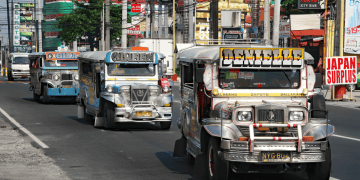Transportation Secretary Vince Dizon announced on Friday that the Public Utility Vehicle (PUV) Modernization Program, now referred to as the Public Transport Modernization Program (PTMP), will proceed as planned. Initiated in 2017, the program mandates that PUVs be equipped with Euro 4-compliant diesel engines to enhance road safety and reduce environmental pollution.
A key component of the PTMP requires drivers and operators to consolidate into cooperatives or corporations. These consolidated entities are eligible for new seven-year franchises, contingent upon the acquisition of a minimum of ten modern jeepneys, which are predominantly mini-buses.
“Members of our transport sector who are hesitant about the program need to understand that we cannot maintain the status quo with our traditional jeepneys and other public transport vehicles. Improvements are necessary,” Dizon stated.
The PUV Modernization Program has faced significant delays since its inception, primarily due to the high costs associated with modern jeepneys, which range from ₱1.7 million to ₱3.3 million per unit. Many operators and drivers find these prices prohibitive. Additionally, the development of route plans, a responsibility assigned to local government units, has been sluggish.
Dizon acknowledged these challenges, emphasizing the need for government intervention to address these issues effectively. “Modernization is indispensable; that’s evident. However, I recognize that I am not yet fully acquainted with all the intricacies. From the reports I’ve reviewed, it’s clear that we must engage in thorough discussions with transport workers, including operators and drivers, as they will bear the brunt of any additional expenses this program entails,” he explained.
He further stressed the importance of collaborative dialogue, stating, “We need to have comprehensive conversations with them, and I believe that a detailed consultation is necessary.”
The PTMP aims to replace traditional jeepneys with vehicles that meet higher emission standards, thereby promoting environmental sustainability and passenger safety. While the objectives are widely supported, the financial implications for small-scale operators and drivers have been a point of contention.
In response to these concerns, the government has previously increased subsidies to assist with the transition. Initially, an ₱80,000 per unit subsidy was offered, which was later raised to between ₱200,000 and ₱300,000, depending on the type of modern jeepney. Despite these efforts, many in the transport sector continue to advocate for more accessible financing options and extended timelines to facilitate compliance.
As the program moves forward, the Department of Transportation plans to intensify its engagement with stakeholders to ensure that the modernization efforts are both inclusive and sustainable, balancing the need for progress with the realities faced by those within the public transport industry.
Breaking supply chain news is just a click away at The Supply Chain Report. Enhance your knowledge of international trade at ADAMftd.com with free tools.
#PublicTransportModernization #PUVModernization #TransportationReform #SustainableMobility #JeepneyModernization #CleanerTransport #RoadSafety #EcoFriendlyTransport #ModernPublicTransport #TransportSector

















